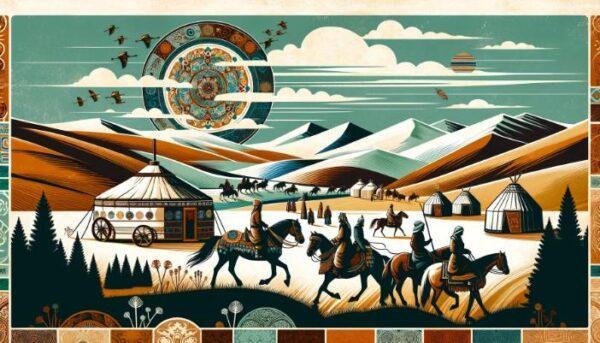Russian warmongers have heavily adduced history in justification for their invasion of Ukraine. Not only have they constructed such a fantasy as a historic mission, but they even believe in its righteousness with unfaltering piety.
Here I also intend to view the Russo-Ukrainian War through the glass of history — definitely not to justify it, but nor even to condemn it, simply to consider it from a deeper historical perspective. To the maximum degree possible, I won’t cite any twisted, biased, consecrated version of history; but rather history in its objective and perhaps dully dispassionate form; a history that is performed in a geographic theater where humans are mere actors and not playwrights.
This history does not begin with the foundation of Muscovy (modern Russia’s earliest emergence as a political unit) in the late Middle Ages, when Moscow was self-christened the Third Rome and claimed the right to dominate the world just because its king married a Greek princess. Neither does it begin at the older time of the Kievan Rus’, where all eastern Slavs trace their common roots. Both these instances, I aspire to show, are highly irrelevant to the essence of Euroasia’s current geopolitical status. To appreciate this, we must look way back into the past for the very origins of civilization.
Some 10,000 years ago — long before Russia, Ukraine, or any notion of nation and state existed — the last Ice Age ended. Temperatures rose, glaciers melted, and big rivers flowed. A lucky band of nomadic human hunters encountered the bank of one of those rivers and whooped at the sight of the robust herds that crowded it. With a stable, boundless supply of game and water, they would need to wander no more. They had found a home, which they named Eden.
Almost concurrently, countless other bands reached the banks of other newly flown rivers; most notably, the seven major rivers that streamed through the globe’s temperate and populated regions: the Nile, Tigris, Euphrates, Indus, Ganges, Yangtze, and Yellow. They soon figured out how to fence cattle and cultivate grains. They built abodes that eventually formed cities. And thus began civilization.
The citizens made rafts and began trading products up and down the rivers, increasing their collective prosperity and enrichening their cultures. Rafts then became ships that ventured out of the river mouths into the open sea. Like a virus, civilization expanded rapidly along the coasts. By the time of the Roman and the Han Empire, the apex of ancient advancement, the entirety of the unfrozen Eurasian coast, from the North Sea to the Sea of Japan, thrived with extensive commercial networks of flourishing cities. Hence the concept of civilization has historically denoted little more than riverine and maritime commerce.
Meanwhile, a whole different play was staged across the cold and barren, vast Eurasian hinterland. There were no great rivers to deposit fertile mud and function as commercial waterways, and the sea was so distant that it constituted the stuff of legends. There was only the steppe.
Its inhabitants weren’t given any opportunity to settle down and erect cities. They had to keep roaming, following the herds in pursuit of the rains and the green pastures. They couldn’t produce anything of too great a value to exchange with the coastal citizens. Therefore, being unable to trade with the cities, they specialized in conquering and looting them. Instead of agriculture and shipbuilding, they developed such crafts as archery and horse breeding. In contrast to trade, they fostered war. Throughout the ancient civilized world, they became known as the people of the steppe.
They were regarded as fearsome, barbarous, merciless warriors. During antiquity, they were known as Scythians or Sarmatians in the West and as Yuezhi or Wusun in the East. They came in hordes of horsemen who slaughtered, pillaged, and incinerated everyone and everything upon their passage. But the worse waves were to come after the West and the East got commercially linked.
Besides engendering the heyday of ancient civilization, the Silk Road ironically brought about its ultimate blight. In addition to goods, merchants exchanged viruses that decimated the populations of both worlds. Moreover, while plaguing them, too, with disease, they acquainted the populations of the intermediary steppe with the wondrous wealth of the civilized world.
Alans, Avars, Goths, Huns, Magyars, Turks in the West… Xiongnu, Khusan, Uyghurs in the East… Wave after wave the steppe hordes invaded and ruthlessly plundered all peripheral, civilized Eurasian lands throughout the Middle Ages. Some ransacked and left. Others stayed and either got assimilated by previous populations or founded their own civilizations, becoming the ones to face the next incursions of their erst kin.
All the while, as the hordes stormed the coasts with swords, civilization expanded steadily into the backcountry with roads and ideas. And by the turn of the 1st Millennium AD, it finally encroached into the steppe itself. Vessels ventured into the Dnieper and the Volga rivers, commercially connecting the Baltic and the Caspian to the Black Sea and Constantinople, and cities were founded along their banks. Concurrently, camel caravans penetrated deeper into the Central Asian heartland, founding more cities and carrying lucrative merchandise between the East and the West. But then the hordes stroke back more ferociously than ever.
The Golden Horde vanquished and ravaged cities from Korea to Anatolia and Southeast Asia to Central Europe. It established an unprecedented nomadic empire across most of the known world under a dynasty of warlords. Civilization was quickly restored throughout the formerly civilized, exterior parts of the Mongol Empire. But the now-united Eurasian interior was gradually taken over by a new semi-civilized empire: the Grand Duchy of Moscow.
And that’s the struggle the ensuing Russian Empire (later known as the Soviet Union and the Russian Federation) has since had to grapple with: Teetering between the commercial tradition of the Kievan Rus’ and the militaristic tradition of the Mongols, viewing cultural infiltration from the part of the sea peoples with suspicion while bearing a culturally embedded ambition to assault the coasts, the Russian nation has striven to find its identity and place in the modern world while preserving the heritage of the steppe.

